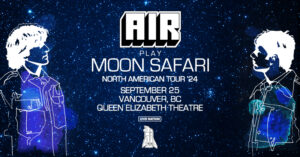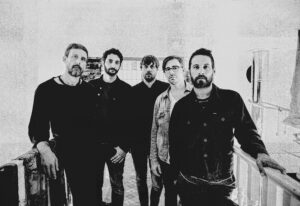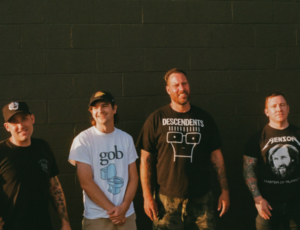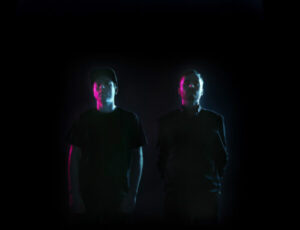The far-reaching smog captured enveloping New York City on the cover of Vampire Weekend‘s third album, Modern Vampires of the City, is complimentary cover art expressing the obvious anxieties towards our coming future. The towers start out clean near the bottom right edge of frame though they soon find themselves invisible behind a layer of sick fog. The band’s name is etched dead centre in crisp white Futura acting as a divider amidst these clouds. In the distance, a small collection of skyscrapers can be seen acting as a wispy collection of hope.
It may be a stretch, but the content of these tracks do revel in this state of disbelief and naive hope that somehow something good will come out of all these fears floating around our metropolises.The light and heavy mixture of melodies echoes their previous albums, and the expected playfulness of their Rolodex of genres does not disappoint. Ezra’s lazy tongue is again able to convey a cunning understanding as well as entertain the eardrums with lyrics describing a youthful sensibility.Rostam’s authorship can immediately be felt in this twisting, twirling take on both classical and contemporary subtleties and subtexts. The oozing collaboration between all four artists (the other two being Baio and Tomson) is refreshing, relatively new, and wholly ambitious. The band has definitely grown into a comfortable machine producing a head-nodding, air guitar-strumming set of tunes that leaves you thinking, laughing, and questioning yourself. However, the light blending of thoughts, although enjoyable, carries with it a foreboding cloud of trouble depicted in the stark album dust jacket.
I’ve chosen the following tracks to discuss the overall theme of the album; those that have been left out are impatiently waiting for you.
“Obvious Bicycle” left me thinking of one of those large hole-punchers you can find in the far back cupboard of an old elementary school classroom. A device that takes effort, when slicing through several sheets of paper. The metallic heartbeat shaking out underneath the movement of cavernous sounds opens up like the referenced sunrise in the opening phrase. This is one of those tracks you catch yourself really connecting to once you’ve digested the first listen.
“Unbelievers” is the train charging calling card of this experience. Ezra, accompanied by bumping, bopping drums and a variety of flicking strings shakes out the headstrong lyrics “I’m not excited, but should I be? / Is this the fate that half of the world has planned for me?” This line hit my brain like a shock wave of familiarity, echoing what I’ve been feeling towards my own future fate. Should I be looking forward to what is to come, or is this as good as it is ever going to get? The questions keep pouring out, even after the third or fourth listen.
From the relative ages of the band mates all kicking around in the twilight of their twenties, there is a definite reflection on their youth felt in the vibrations coming from my computer speakers. In “Step”, a window into this shredding youth they still somewhat hold in themselves is calling for community, love, and the aspirations they themselves may not have yet achieved. Although ambitious, they seem to be trying to inspire their listeners to act on themselves in this whirlpool world of conflict and confusion. The line “I can’t do it alone, I can’t do it alone,” is fairly explicit, a simple statement that has a bold connotation of this album’s overall theme of questioning the future. “The gloves are off / The wisdom teeth are out / What you on about?/ I feel it in my bones / I feel it in my bones.”
“Diane Young“, when said aloud, recalls Eraz’s intellectual wordplay, evoking thoughts of the other side. The female character that comes to my mind is a wild callow being of health. Something so focused on the present moment the future seems out of reach. The Buddy Holly-ness at times feels a tad overdone, with the reverb echoing, closing in on being a gimmicky “baby, baby, baby…etc”. Though I imagine played live the effect would elicit a more engaged response, it’s the only song that I felt upon first listen was engrossed in its own performance. Whatever Ezra is going through is clear in this track that he and I hold the same feeling about being young, the desire for it to never escape.
In “Everlasting Arms”, the rolling bass of Baio coinciding with tinkering thuds of Tomson’s wooden sticks immediately tranquillizes and dissolves the listener. The buildup is slow, like waiting for an expected embrace, hence the song’s title. Ezra’s penchant for chandeliers pipes up once again and wide-eyed classical strings colour in whatever is left.
Jumping away from the grey mixture described above summer-ish excitement can be felt in the body-rocking track, “Finger Back”, a quirky account of an apparently true event concerning an orthodox girl who fell in love with a guy in a falafel shop. The shrill vocal strength is awesome and fun, flying into Rostam’s harmonic confusion.
The interconnectedness of this collection of tracks is everything you expect to hear when listening to these bloodsuckers, wrapped and gifted for the listener. The progression and exploration of new ideals feels just as fresh as the last two. Modern Vampires of the City, although dark in certain corners, encompasses the overall message of hope, the struggle with one’s morality, and the desire to hold onto one’s youth. The black and white metropolis advertises this ideal that something will come out of all this strife and confusion that has clogged our eardrums for so long. That change will come with us, the few and so many that see that small cluster of buildings beyond the dismal fog reminiscent of T.S Eliot’s wasteland.










